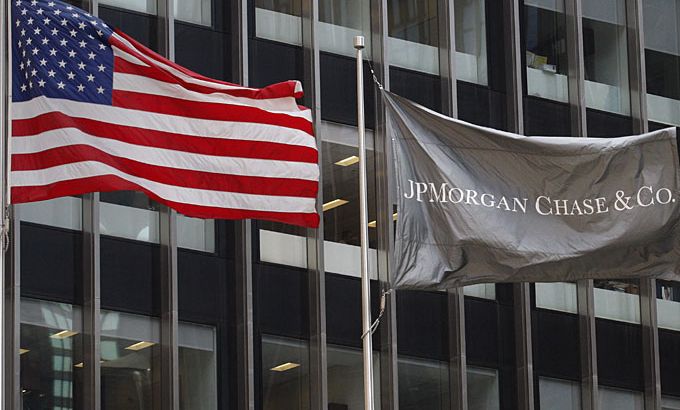
Can US banks be trusted to self-regulate?
As JPMorgan posts a massive $2bn trading loss we ask if this strengthens the case for greater regulation of Wall Street.
Several leading politicians in the US Congress are demanding that federal regulators strengthen proposed banking rules and scrutinise trading more closely.
The call follows a $2bn trading loss disclosed last week by JPMorgan Chase, the country’s biggest bank.
Keep reading
list of 4 items‘Why should we vote?’ India’s jute workers blame politicians for woes
California farmworkers cheer new housing in town scarred by mass shooting
Russia’s Putin eyes greater support from China for Ukraine war effort
|
“We have crony capitalism. We have a system where Wall Street got to write the laws. If the mafia got to write the laws loan-sharking would be legal. [Wall Street] got to write the laws reversing the rules that came out of the last depression … demanding transparency, accountability, the oversight.” – Robert Scheer, the editor-in-chief of news website Truthdig.com |
Heads have already started rolling, with the resignation on Monday of Ina Drew, the bank’s chief investment officer, who some regard as the most powerful woman on Wall Street.
That bad trade strikes at the heart of the debate about Wall Street regulation. The loss will not cause the bank to collapse, nor will it need a government bailout. But the news has intensified the belief among some that banks should not, or perhaps cannot, regulate themselves.
Since the most recent economic meltdown, which many say was caused by financial institutions taking excessively risky bets, the US government has tried to reform banking regulation in a piece of legislation known as The Dodd-Frank Wall Street Reform and Consumer Protection Act, passed in 2010.
But many of the regulations contained within it have not yet been implemented, largely due to opposition from Wall Street lobbyists. They say the reforms go too far and would restrict the ability of banks and other financial institutions to make loans.
Jamie Dimon, JPMorgan’s CEO, has consistently lobbied against financial reform but is now on a campaign to limit the damage. Initially he dismissed concerns as “a tempest in a teapot” but now calls it a “terrible, egregious mistake”.
|
“There are 3,000 to 4,000 Wall Street lobbyists, very well-paid, very well-educated, very hard-working …. The regulators suffer the Stockholm Syndrome, they’ll have 100 meetings and 99 of them will be from bankers so they are themselves beginning essentially to parrot what they hear from the bankers.” – Bartlett Naylor, a financial policy advocate at Public Citizen |
On Sunday’s edition of the US network show Meet the Press, Dimon said: “We have supported 70 per cent or so of Dodd-Frank. We supported resolution authority, we supported higher capital liquidity, JPMorgan always had higher capital liquidity partly to make up for mistakes and problems and obviously it’s a tough economy.”
So, just how much do banks like JPMorgan spend lobbying in Washington?
Commercial banks spent nearly $62m on lobbying in 2011. Of this, $8.5m came from the American Bankers Association. Of the individual banks Wells Fargo spent $7.8m, JPMorgan Chase $7.6m and Citigroup $5m.
Inside Story Americas asks: Are US politicians serious about introducing federal regulation of financial institutions? And, does the JPMorgan Chase announcement settle the debate on whether Wall Street needs more regulation?
To discuss this presenter Shihab Rattansi is joined by: Mark Calabria, the director of Financial Regulation Studies at the CATO Institute and a senior staffer on the US Senate Committee on Banking; Robert Scheer, the editor-in-chief of the online news website Truthdig.com and the author of The Great American Stickup: How Reagan Republicans and Clinton Democrats Enriched Wall Street While Mugging Main Street; and Bartlett Naylor, a financial policy advocate at Public Citizen, an organisation that campaigns on behalf of citizen interests before Congress, and the former investigations chief at the US Senate Banking Committee.
|
“What this really says is we can allow investment banks to take multi-billion dollar losses without having to have the taxpayer cover those losses, and the world continues. We did not have our financial Armageddon and the system did not shut down.” Mark Calabria, the director of Financial Regulation Studies at the CATO Institute |
JPMORGAN CHASE LOSSES:
- The bank revealed a $2bn trading loss on Friday, causing $13bn to be wiped off its value
- Reports of risky transactions first emerged in April
- Ina Drew, its chief investment officer and one of the highest-ranking women on Wall Street, resigned. She was reportedly paid $14m in 2011
- The US Securities and Exchange Commission is investigating the large trading loss
- Standard & Poor’s revised the post-loss outlook from stable to negative
- Fitch Ratings downgraded the bank from A-plus to AA-minus
|
THE DODD-FRANK ACT: |